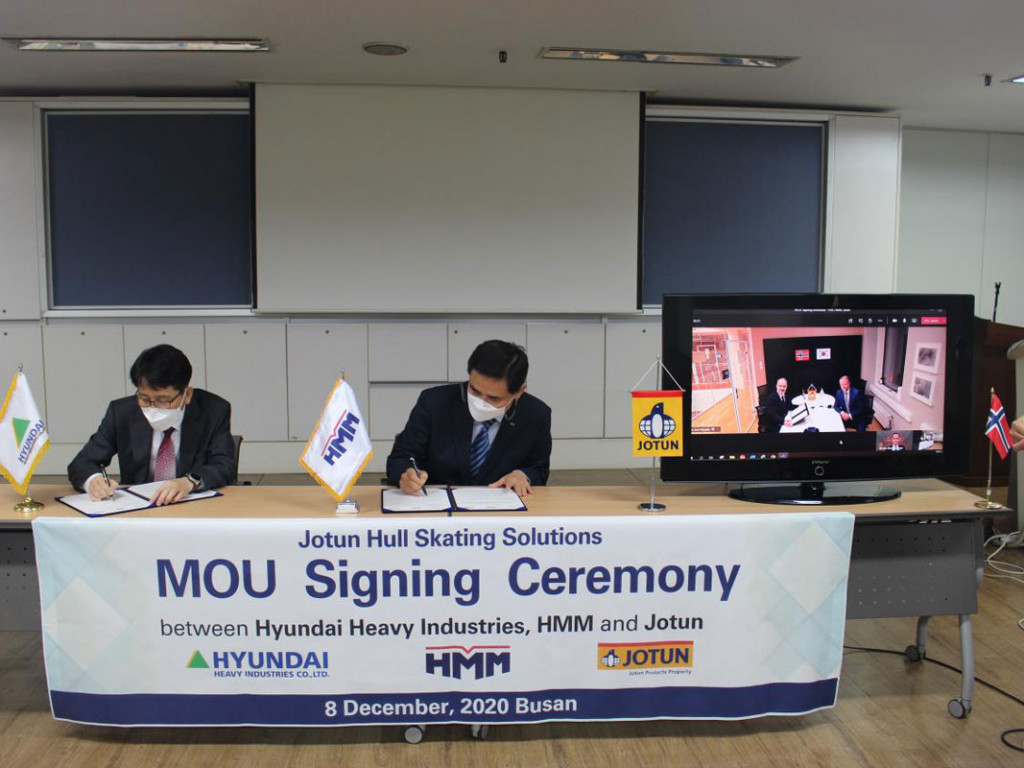Three global shipping leaders have united to sign a MOU in a push for cleaner, more efficient and greener vessel hull performance.
Hyundai Heavy Industries (HHI), which controls about 10% of the global newbuild market, has reached agreement with container line giant HMM Co., Ltd and Jotun, the world’s number one supplier of marine coatings, to utilise Jotun’s revolutionary Hull Skating Solutions (HSS) on a series of newbuilds. The agreement, signed 8 December, will see Jotun HullSkater proactively inspect and clean vessel hulls during outfitting to ensure optimal environmental performance and protection.

Jotun launched HSS to the market earlier this year, effectively rewriting the rulebook for hull cleaning and performance. HSS consists of the unique HullSkater, which adheres to vessels and gently removes all biofouling for an ‘always clean’ hull, the specially developed SeaQuantum Skate antifouling, and proactive condition monitoring utilizing a proprietary big data algorithm tailored to individual vessel needs.
“The combination is ideally suited to vessels facing the most challenging biofouling conditions,” explains Geir Axel Oftedahl, Business Development Director, Jotun. “In that respect it is perfect for protecting newbuilds at outfitting and trial stages.”
Proactive pioneers
He continues: “HSS cleans hulls before biofouling takes hold, eliminating associated drag and fuel consumption and emissions, while protecting the vessel coatings, and safeguarding ecosystems from the potentially invasive species that look to populate them. Biofouling is a particular problem when vessels are idle for long periods, such as during outfitting, and this can cause major issues when trialling initial performance before delivery.”
Morten Sten Johansen, Regional Marine Director, North East Asia, adds: “HHI and HMM are demonstrating their understanding of this issue, and their commitment to absolutely optimal environmental protection, by signing a ‘first of its kind’ MOU. Working together we will now use breakthrough technology to tackle the biofouling challenge simply, effectively, and with minimal disruption and maximum impact. We believe this is a new way of working, for a new breed of forward-thinking owners and yards. We’re delighted to be involved in such a landmark industry project.”
HHI is currently building a series of state-of-the-art 16,000 TEU container ships for HMM. HSS will be deployed to ensure the ships meet environmental key performance indicators, maintaining clean hulls, pristine coatings, providing optimal efficiency and limiting any potential release of biocides. The HullSkater will move from hull to hull during key outfitting stages.
Sustainable commitment
Speaking of the decision to enter the MOU, Jong-Chul Choi, Executive Vice President, HMM, comments: “HMM is committed to building a fleet that is defined by sustainable innovation, enabling us to hit our ambitious target of achieving zero CO2 emissions by 2050. We aim to be proactive in identifying, adopting and developing the best solutions, and Jotun’s approach to hull cleaning is the perfect fit for that strategy. We look forward to seeing the results of HSS and welcoming the latest additions to our environmentally friendly fleet into operation.”
Oh-Min Ahn, Executive Vice President, HHI, adds: “Sustainability sits at the core of our activity here at HHI, and we are focused on partnering with pioneering owners and suppliers to pave the way for a cleaner, greener industry that can set sail towards achieving IMO’s decarbonization goals. This agreement with two other leaders in their respective segments shows how we collaborate to deliver both environmental and commercial benefits for the industry. It’ll be very interesting to watch the HullSkater solving the biofouling problem once and for all. We believe this development can significantly contribute to a paradigm shift in the marine coatings market in the future.”
HSS’ unique robotic cleaning units are controlled by specialist Jotun operatives via 4G connections. The Norwegian headquartered company estimates that if all ships facing severe biofouling challenges adopted the proactive HSS approach, maritime CO2 emissions could be reduced by at least 40 million tons per year.









